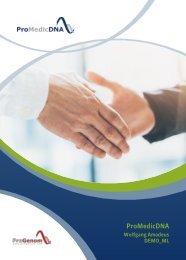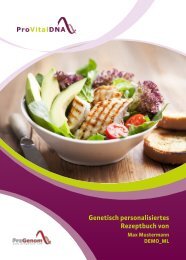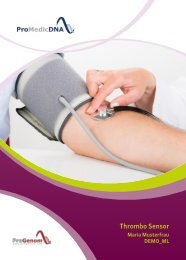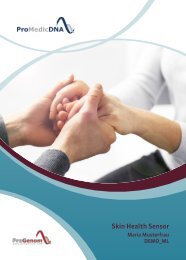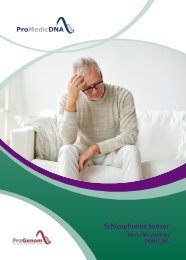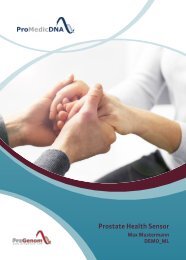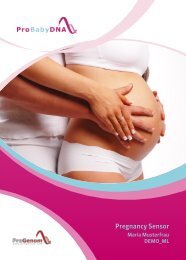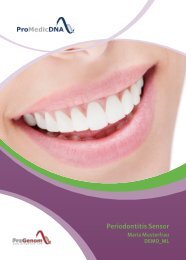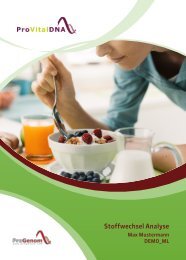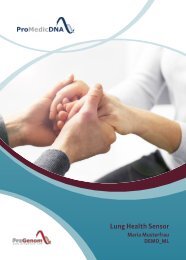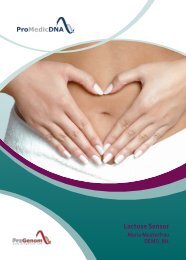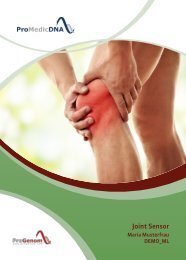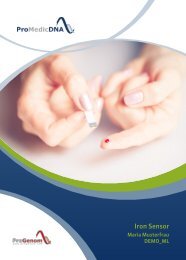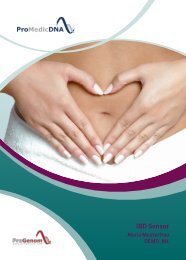ProVitalDNA - Package - DEMO EN
non-medical analysis - ProVitalDNA
non-medical analysis - ProVitalDNA
Create successful ePaper yourself
Turn your PDF publications into a flip-book with our unique Google optimized e-Paper software.
Parnell LD, Coltell O, Lee YC, Ordovas JM.<br />
➤ http://atvb.ahajournals.org/content/18/10/1606.long Arterioscler Thromb Vasc Biol. 1998 Oct;18(10):1606-10. Postprandial lipemic response is<br />
modified by the polymorphism at codon 54 of the fatty acid-binding protein 2 gene. Agren JJ, Valve R, Vidgren H, Laakso M, Uusitupa M.<br />
➤ http://www.ncbi.nlm.nih.gov/pubmed/?term=17378725 Clin Chem Lab Med. 2007;45(3):316-20. Polymorphisms in the APOA1/C3/A4/A5 gene<br />
cluster and cholesterol responsiveness to dietary change. Hubacek JA, Bohuslavova R, Skodova Z, Pitha J, Bobkova D, Poledne R.<br />
➤ http://www.ncbi.nlm.nih.gov/pubmed/?term=12630956 Clin Genet. 2003 Feb;63(2):109-16. The PPAR-gamma P12A polymorphism modulates the<br />
relationship between dietary fat intake and components of the metabolic syndrome: results from the Québec Family Study. Robitaille J, Després<br />
JP, Pérusse L, Vohl MC.<br />
➤ http://www.ncbi.nlm.nih.gov/pubmed/?term=21179003 Int J Obes (Lond). 2011 Aug;35(8):1041-9. doi: 10.1038/ijo.2010.263. Epub 2010 Dec 21.<br />
Association between fat intake, physical activity and mortality depending on genetic variation in FTO. Sonestedt E, Gullberg B, Ericson U, Wirfält<br />
E, Hedblad B, Orho-Melander M.<br />
➤ http://www.ncbi.nlm.nih.gov/pubmed/?term=20975728 Int J Obes (Lond). 2011 May;35(5):666-75. Epub 2010 Oct 26. Association between the<br />
APOA2 promoter polymorphism and body weight in Mediterranean and Asian populations: replication of a gene-saturated fat interaction. Corella<br />
D, Tai ES, Sorlí JV, Chew SK, Coltell O, Sotos-Prieto M, García-Rios A, Estruch R, Ordovas JM.<br />
➤ http://www.jlr.org/content/41/12/2002.long J Lipid Res. 2000 Dec;41(12):2002-8. Effects of an Ala54Thr polymorphism in the intestinal fatty acidbinding<br />
protein on responses to dietary fat in humans. Pratley RE, Baier L, Pan DA, Salbe AD, Storlien L, Ravussin E, Bogardus C.<br />
➤ http://www.ncbi.nlm.nih.gov/pubmed/?term=17211608 J Mol Med (Berl). 2007 Feb;85(2):119-28. Epub 2007 Jan 9. APOA5 gene variation modulates<br />
the effects of dietary fat intake on body mass index and obesity risk in the Framingham Heart Study. Corella D, Lai CQ, Demissie S, Cupples LA,<br />
Manning AK, Tucker KL, Ordovas JM.<br />
➤ http://jn.nutrition.org/content/139/12/2301.long J Nutr. 2009 Dec;139(12):2301-8. Epub 2009 Oct 14. Apolipoprotein A5 polymorphisms interact<br />
with total dietary fat intake in association with markers of metabolic syndrome in Puerto Rican older adults. Mattei J, Demissie S, Tucker KL,<br />
Ordovas JM.<br />
➤ http://jn.nutrition.org/content/141/12/2219.long J Nutr. 2011 Dec;141(12):2219-25. Epub 2011 Nov 2. A High Intake of Saturated Fatty Acids<br />
Strengthens the Association between the Fat Mass and Obesity-Associated Gene and BMI. Corella D, Arnett DK, Tucker KL, Kabagambe EK, Tsai M,<br />
Parnell LD, Lai CQ, Lee YC, Warodomwichit D, Hopkins PN, Ordovas JM.<br />
➤ http://jn.nutrition.org/content/141/3/380.long J Nutr. 2011 Mar;141(3):380-5. Epub 2011 Jan 5. APOA5 gene variation interacts with dietary fat<br />
intake to modulate obesity and circulating triglycerides in a Mediterranean population. Sánchez-Moreno C, Ordovás JM, Smith CE, Baraza JC, Lee<br />
YC, Garaulet M.<br />
➤ http://www.ncbi.nlm.nih.gov/pubmed/?term=16311100 Metabolism. 2005 Dec;54(12):1652-8. Comparison of the acute response to meals enriched<br />
with cis- or trans-fatty acids on glucose and lipids in overweight individuals with differing FABP2 genotypes. Lefevre M, Lovejoy JC, Smith SR,<br />
Delany JP, Champagne C, Most MM, Denkins Y, de Jonge L, Rood J, Bray GA.<br />
➤ http://www.ncbi.nlm.nih.gov/pubmed/?term=14981227 Obes Res. 2004 Feb;12(2):340-5.Intestinal FABP2 A54T polymorphism: association with<br />
insulin resistance and obesity in women. Albala C, Santos JL, Cifuentes M, Villarroel AC, Lera L, Liberman C, Angel B, Pérez-Bravo F.<br />
Statement 2<br />
People react differently to the carbohydrate content of their diet.<br />
A study in the Journal of Nutrition showed that people with the Gln27Glu polymorphism in the ADRB2 gene have a<br />
significantly higher risk of excessive weight (OR: 2.56) if they receive more than 49% of daily calories from<br />
carbohydrates.<br />
Publications<br />
➤ http://www.ncbi.nlm.nih.gov/pubmed/12888635 J Nutr. 2003 Aug;133(8):2549-54. Obesity risk is associated with carbohydrate<br />
intake in women carrying the Gln27Glu beta2-adrenoceptor polymorphism. Martínez JA, Corbalán MS, Sánchez-Villegas A, Forga<br />
L, Marti A, Martínez-González MA.<br />
Statement 3<br />
You can customize the proportion of carbohydrates and fat in the diet based on your genetic<br />
predisposition. Fat sensitive individuals benefit from a low-fat diet, while carbohydrate sensitive people<br />
benefit from a low-carbohydrate diet.<br />
From these two genetic tendencies, we can determine if a person is sensitive to the amount of carbohydrates or the<br />
amount of fats in the diet. If, according to the 16 aforementioned publications, a person is less sensitive to the amount of<br />
fat in the diet, that person has a tendency to become overweight only when the carbohydrate calories are above 49%; as a<br />
consequence, a diet with higher fat and lower carbohydrate content will have a positive effect on the body weight. A<br />
person with the right polymorphisms is not going to gain weight when their diet will contain more fat and fewer<br />
carbohydrates, within the investigated parameters.<br />
<strong>DEMO</strong>_ML Page 239 of 295




